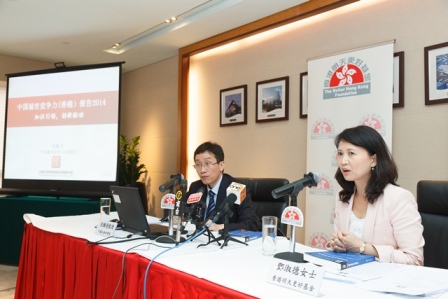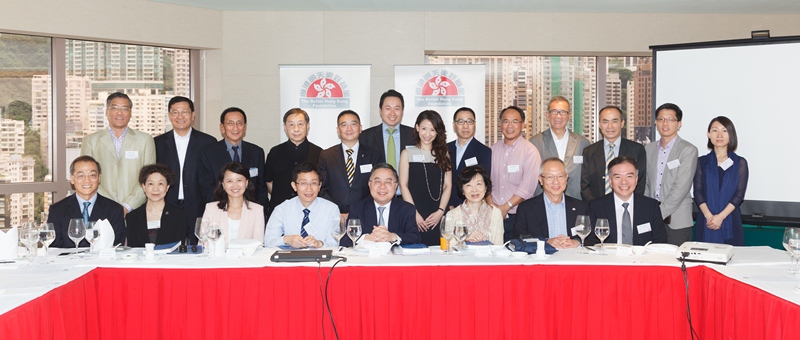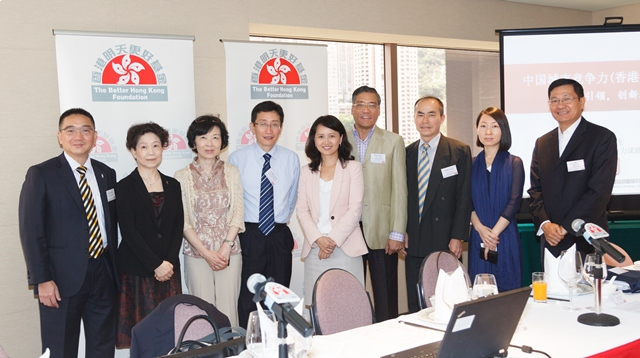The press conference of 2014 China Urban Competitiveness Report (Hong Kong) was held in Hong Kong on 29 May 2014. It was organized by the Better Hong Kong Foundation and co-organized by Center for City and Competitiveness of the Chinese Academy of Social Sciences and Hong Kong Institute of Asia-Pacific Studies of the Chinese University of Hong Kong. Led by Prof. Ni Pengfei of the Chinese Academy of Social Sciences, the theme of the 2014 Report is “YRD: the emerging global mega economic region”. For Hong Kong, the key suggestion is “promoting research and innovation, developing a knowledge-based economy”. Through strengthening the research and innovation and making it a new driving force for the development of Hong Kong, Hong Kong can alleviate the risks and challenges and release the potential of innovation to further enhance Hong Kong’s competitiveness. The press conference was chaired by the Foundation’s Executive Director Ms. Karen Tang where Prof. Ni gave a presentation on the report and further explained the overall competitiveness of Hong Kong.

The Foundation’s Executive Director Ms. Karen Tang (right) and Prof. Ni Pengfei presenting the report to Hong Kong media
The top ten cities in the Comprehensive Economic Competitiveness Index in 2013 are Hong Kong, Shenzhen, Shanghai, Taipei, Guangzhou, Beijing, Suzhou, Tianjin, Foshan and Macao. Hong Kong keeps the top position in comprehensive economic competitiveness but the speed of growth is slowing down. The sub-index of overall efficiency competitiveness is ranked third after Taipei and Macao. Hong Kong has a significant advantage in GDP per unit of land, thanks to its dense population and commercial activities, a high degree of agglomeration, streamlined business regulations, a clean government, good supporting facilities and efficient services. However, the sub-index of overall incremental competitiveness is ranked eighteenth, fell by ten places from last year. Hong Kong is suffering from the gradual weakening of the advantages in talent, software and hardware facilities. There is no significant enhancement of the atmosphere of innovation and entrepreneurship. Land shortage-induced high rents hinder the development of small and medium-sized enterprises. Hong Kong is also over-dependent on financial and real estate sectors and lacks stable sectors for growth.
Hong Kong also has a top position in sustainable competitiveness but the sub-index of knowledge-based city and the sub-index of info-city are weakening. Its index in knowledge-based city is ranked fourth after Beijing, Shanghai and Shenzhen. Hong Kong’s R&D expenditure, in terms of the percentage of GDP, is much lower than the one in Japan, South Korea, Singapore and the Mainland. Hong Kong also lacks effective incentive system for technological innovation, along with the weak atmosphere of innovation and ability of knowledge transfer. All these are the major problems in Hong Kong.
Concluding the press conference, Ms. Karen Tang, Executive Director of the Foundation commented that “Hong Kong ranks the 1st in both Comprehensive Economic Competitiveness and Sustainable Competitiveness. Hong Kong performs well in many aspects. To maintain our advantage in competitiveness and create a win-win situation, Hong Kong needs long-term plans for policies such as population and land use, should focus on nurturing research and innovation, and must play the role of ‘super connector’ well with its positioning in China in the context of ‘going-out, bringing-in’ policy.”
Before the press conference, the Foundation’s Executive Committee Chairman chaired a luncheon discussion where members of the Foundation and invited guests exchanged and shared their views on the report.

Please refer to the PowerPoint presentation of the press conference for highlights of the report.


